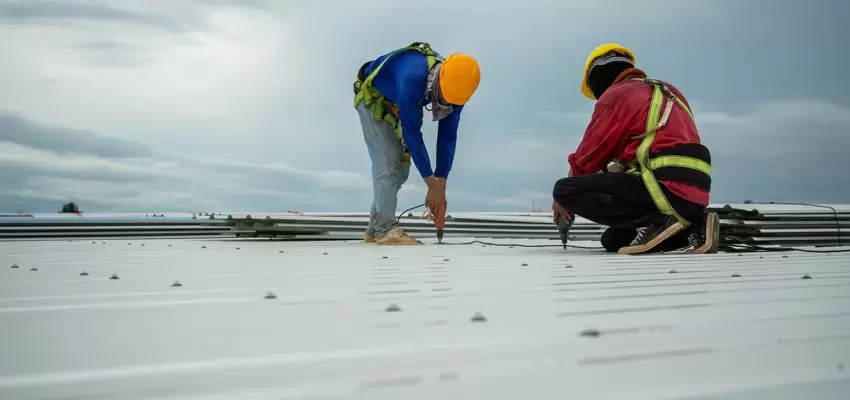A roof is essential to any space; repairing it can be daunting. With a wide range of roofing contractors to choose from, it is necessary to consider various factors and approach the plan with clarity. Here are a few tips for you to consider if you’re looking for a roofing contractor.
Post your Requirement
Evaluate Your Roof:
Before hiring a roofing contractor, it is important to have a clear understanding of your roofing needs. For that, you need first to assess your roof damage, Look for signs of damage or wear and tear, which can include;
- Leaks and water damage: Check for water stains on your ceilings and walls, which can indicate leaks. Take a quick inspection of the house, especially the attic for any signs of moisture and cold.
- Shingle Condition: Examine your shingles for curling, cracking, or missing pieces. Damaged shingles can compromise the integrity of your roof.
- Sagging Areas: A sagging roof can signify structural damage to the entire construction. This may require immediate attention from a professional to prevent further deterioration.
- Gutter Issues: Make sure your gutters are clear of debris and properly attached. Overflowing or sagging gutters can cause water damage to your roof and home exterior.
Identifying the right Roofing Materials:
Choosing the right materials is also an important part of the step as it promises longevity and performance. The type of material you select will depend on several factors like climate, budget, and aesthetic preferences. Some common materials include:
- Asphalt shingles: Popular for their ease of installation and affordability asphalt shingles are available in the market in a variety of shades and styles. They provide good protection against the elements and typically last 15-30 years.
- Metal Roofing: Known for their durability and efficiency, metal roofs can last 40-70 years. They are resistant to extreme weather conditions and are available in various styles, including panels and shingles.
- Tile Roofing: Made from clay or concrete, tile roofs are highly durable and can last up to 50 years or more. They are ideal for warmer climates and offer excellent fire resistance.
- Wood Shingles and Shakes: Offering a Natural and rustic appearance, wood shingles and shakes are made from cedar, redwood, or pine. They typically last 20-40 years but require more maintenance than other materials.
- Slate Roofing: Slate is a high-end, natural stone material that can last over 100 years. It is highly durable and offers a distinctive look but can be more expensive and heavier than other options.
Estimating the Project Scope:
Once you have calculated the damage and selected your materials, move ahead with estimating the scope of your roofing project. This involves determining the size of your roof, the extent of the work needed, and the overall cost.
- Measure your Roof: Calculate the square footage of your roof by measuring the length and width of each section and multiplying them together. Add up the total square footage to get an accurate measurement.
- Examine the Extent Repairs: Decide whether you need a partial repair, such as replacing a few shingles or sections, or a full roof replacement.
- Estimate Material Costs: Research the cost of your chosen materials, including underlayment, shingles, and flashing, and add any additional costs.
The Role of a Roofing Contractor
Roofing contractors are professionals who specialize in the installation, repair, and maintenance of roofs. Their responsibilities encompass a wide range of tasks, including:
- Roof Inspection: Conduct thorough inspections to assess the condition of the roof, identify damage, and recommend necessary repairs or replacements.
- Project Planning: Develop detailed project plans that outline the span of work, materials required, timelines, and cost estimates.
- Installation and Repairs: Perform the physical work of installing new roofs or repairing existing ones. This includes tasks such as laying shingles, installing insulation, and repairing leaks.
- Material Selection: Advice on the best roofing materials based on your specific needs, budget, and local climate conditions.
- Warranties and Guarantees: Provide warranties on both labor and materials and make sure that the work will be done correctly.
The Importance of Hiring Professional
Hiring a professional roofing contractor offers numerous benefits:
- Expertise and Experience: Professional roofing contractors have the training and experience needed to handle a variety of roofing issues.
- Quality Materials: Contractors have access to high-quality materials and can recommend the best options for your roof.
- Safety: Roofing work can be dangerous, especially if you lack the proper equipment and training.
- Time and Efficiency: Professionals can complete roofing projects more quickly and efficiently than an untrained local.
- Warranty and Insurance: Reputable Contractors offer warranties on their work, which protects them in case of future issues.
Finding the Right Roofing Contractor
Now that you understand the importance of hiring a professional roofing contractor, the next step is to find the right one for your project. Check online reviews and ask for references to examine the previous work of a contractor. Verify that the contractor has adequate insurance coverage and experience in the specific type of roofing project you need whether it’s residential or commercial. Obtain multiple quotes to compare prices and services to have your roofing project completed to the highest standards, providing long-lasting protection for your space.























Post A Comment